Bubba Watson exclusive: The maverick master of Augusta on luck, LIV and the lies players tell
Published: Last updated:
A decade on from winning the Masters for a second time, Bubba Watson is happy, healthy and hungry for success again after being inspired by Phil Mickelson.
Gerry Lester ‘Bubba’ Watson Jnr is sitting at his home in Bagdad, Florida, perusing the many mementos and trophies which sit proudly behind his desk.
He directs our eyes towards the Masters trophy and a flag which was signed by all the players who were present at the 2016 Champions Dinner, the last one ever attended by Arnold Palmer. “Arnie signed right in the middle with all the other great champions,” says Bubba, smiling.
On the shelf below there are two solid gold clubs, one which was presented to him for that 40-yard hook shot during his 2012 Masters playoff victory, the other a Ping putter that commemorates his second victory at Augusta 10 years ago. Both are reminders of more complicated times.
Bubba was a top-five player in the world back then, one of the biggest, most ubiquitous stars of the PGA Tour and Ryder Cup. He should have been happy, but his battles with anxiety meant he very rarely was.
For years he would suffer in silence, not knowing how to deal with his fears and frustrations. Sometimes it would get too much, which is when he would act out on the course and play the blame game to anyone within earshot.
His rap sheet was big and his critics many. In a vote by his peers in 2015, he was declared the most unpopular player on the PGA Tour.
There’s a lot, he says, that he regrets about how he dealt with fame and his ADHD, which is why he is quite literally an open book now about his physical and mental health struggles and the things that bother him the most. (Spoiler alert: There are quite a few).
We sat down with him after the second LIV event of the season and spoke at length about his inner demons, his new role as a mentor and captain, and why he believes he can win the Masters for a third time next month…

Let’s start with one of the most iconic shots in Masters history: your wedge from the woods in 2012. There was a lot that could have gone wrong. Most people would have played safe. Why didn’t you?
Well, if you look back in 2010, I lost to Martin Kaymer in the PGA Championship when Dustin (Johnson) got the two-shot penalty. So, for me, there was no other shot in my mind.
There’s a lot of reasons why I thought it was the best shot. The person I was playing against was just short of the green. I also knew that even if it didn’t draw enough, I was still going to be down there in the fairway, by those big pine trees, with the ability to get up and down.
With a lay-up, we would have been hitting towards the bunker, but then you’ve got that 80, 90-yard bunker shot. That’s why there was never a doubt, there wasn’t even any second guessing.
Did it come out exactly how you envisaged it then?
Better! If I had about 40 foot to two putt to win, that’s a whole different ball game. But having about 12 feet made it a lot easier to tap it down there and tap it in.
I can’t imagine many people have practiced hooking a wedge 40 yards. Or had you?
(Laughs) As a kid, Boo Weekley and Heath Slocum were my idols growing up. They were in high school before me. I played a lot of golf with them on a golf course called Tanglewood in Milton, Florida, and it had a lot of trees, a lot of dirt, a lot of pine straw – a lot of things where you have to maneuver the ball. So yeah, I’ve hit that shot many times. Obviously, under the pressure, you can never simulate that, but the shot to me wasn’t as difficult as a hook and hope.

Have you managed to replicate it since?
I’ve hit it one other time. I took Ted Scott, my old caddie, to play there. It was a right-handed club, flipped over left-handed, and I hooked it just to show him I could do it.
Where did it go?
I did it good (laughs).
How many times as a kid did you pretend to hole that winning putt?
Lots. I mean, I don’t know if I’m allowed to say this but everybody in the world – no matter what country they’re from – the Masters is the one they want to win. Now, they might say publicly they want to win the British Open but let’s be honest, it’s the Masters. There’s no secret. You want to put on the Green Jacket because it’s iconic.

What are some of the coolest perks of being a Masters champion?
I love the NBA and being the Masters champion, a lot of people know who you are. I’ve been able to meet a lot of NBA players, NFL players too. I’ve talked to seven Presidents of the United States. There are things that I’ve experienced that don’t normally happen to a guy named Bubba from Bagdad, Florida. I’ve had rappers rap about me. It’s crazy.
Did winning the Masters for a second time mean more because of the validation it gave you?
Yeah. I think so. I’m not saying that if you’ve only won one tournament it’s a fluke, but I wanted to prove to myself I could do it again. To do that and say I’m a two-time champion is a thrill for me. I never truly thought I could get one. Now I’ve got two!

Once the euphoria of winning in 2012 died down, did you ever suffer from impostor syndrome or a feeling that you didn’t somehow belong?
Luckily, counting the Hero World Challenge, I’ve won 13 times so it was never that. But as soon as you win one Major, selfishly you want to win another and prove to yourself and prove to others that it’s not a one hit. You set new goals for yourself.
Even now, I had surgery two years ago and I’m looking forward to trying to compete with what Jack Nicklaus did. He was 46 when he won, I’m 45 now. Phil (Mickelson) won a Major at, what, 50, almost 51? So yeah, you want to have that chance.
I still believe I can win it. It’s a golf course that sets up well for me, with not high rough. I want to challenge and maybe have another interview with you when I’m a three-time champion.
The course is constantly changing, some might say they’ve ‘Bubba proofed’ some of the holes, especially the 13th after some of the drives you’ve hit in the past. Do you prefer the way it is now?
No, I don’t. You know, I think we get carried away. They added length to 11, they added length to 13 and shifted it over. You’ve got to remember the trees are growing at this time. The trees in the first Masters were a lot shorter than they are now. They cut the trees on one side so they overhang the fairway. They are already doing little tricks to change the course.
When you’re adding length, you are taking away the roars. I don’t understand it because you want the fans to cheer. We celebrate somebody scoring 50 points in the NBA, but when somebody shoots five-under at a Major we’re like, hold on a second, this is not right. I just think we go too deep into it, instead of just letting us be golfers and letting us be good at what we do. People want to see birdies win, not people parring in.
To add to that point, then, were you not a fan of the US Open?
Oh, man, I couldn’t stand the US Open. My reasoning is different from most people’s. Yes, it was too severe and they’ve tried to level it out now, but for me it was visually intimidating.
Mentally, I wasn’t able to comprehend missing the fairway by a foot and being dead where you have to chip out. That’s not how I see the game of golf.
I never felt comfortable at the US Open. It doesn’t give you a chance to hit these heroic shots and to show your talent of being able to get out of trouble. That’s what I think the Masters does so well. They don’t have to trick up the rough and do all these things. You just play golf. But you can create these amazing shots. Look at Phil on 13.
We can sit here for days and talk about all the great shots that Tiger has hit throughout Augusta’s history. At a US Open, you can’t create stuff like that. You create a chip out.

Is that one of the reasons you’ve performed so well at the Masters, because it allows you to play with freedom and to take risks?
Yeah, 100 percent. When you show up, it’s not all that intimidating. I mean, don’t get me wrong, it is intimidating because of the pressure.
But when I stare down the 1st fairway and No.2, there is no high rough or OB. There is nothing you are truly fearing. You feel like you can play. And I’ve always been one of the top lag putters and that course demands lag putting. Those are the two things: lag putting and being able to recover. They have both helped me around that golf course.
And it also helps being able to move the ball both ways.
Yeah. Off the tee, I’m focused on one thing. I’ve built my driver to cut so that I can move the ball from right to left. Jack Nicklaus was a cutter, but he drew his 3-wood a lot around Augusta so if you look at his draw and my cut, it’s perfect. And I can draw the ball when I need to, especially with my irons.
When I’m on, I have the ability to draw or cut the ball to certain flag locations. That’s what Jack always talked about, he would aim for the center of the green and get the ball moving toward the flag stick. He’s talked about that many times and that’s kind of what I’ve been able to do.
How do you train something like that on the range?
Truthfully, it’s so hard to hit one dead straight. It doesn’t matter if it’s 50 yards, 100 yards, 200 yards. You’re going to miss it left or right. In my mind, I always felt it was easier to move the ball. So if I aim it 20 yards to the left, I can make myself draw it and not double-cross it. Or vice versa. I guess I’ve just always felt more comfortable moving the ball.
You’ve made no secret of the fact you’ve never had a lesson. Have you never been tempted?
I mean, there have been people who I’ve asked, ‘Hey man, is there anything you see that I’m doing differently?’ Teddy, who was on my bag for 15 or 16 years, I would ask him all the time. But really what it comes down to is mental and being focused on something else, instead of focusing on that shot in that moment.
We’ve heard the phrase ‘Bubba Golf’ used a lot. What does Bubba Golf mean to you?
It’s having fun. It’s the reason why I went to LIV because it’s fun and energetic. You’re still grinding, still trying to have your best day ever, but you’re trying to create the game in a different way. Kind of like Bryson [DeChambeau] doing something different. Tiger decided to win all the time. Everybody has a different route. Bubba Golf is more about the everyday man.

In your press conference after winning in 2014, you said you got lucky winning two Masters. Do you still feel that way?
Yes, I do. Winning a golf tournament takes a lot of movement. It takes me playing well and the people behind me not playing their best. If you go back to the first Masters I won, Louis (Oosthuizen) made the first double eagle on TV. He’s up four on me with 16 holes to play. After three-putting 12, I birdied four in a row and nobody else really birdied. So, I went from four down to tied. I then hit it in the trees in the playoff and I had a shot to the green, which I pulled off.
In ’14, Spieth birdied seven to go three up on me. I birdied eight and nine, Spieth three-putted eight from 20ft, didn’t get up and down on nine, and all of a sudden I’m one up. He hit it in the water on 12 and then nobody birdied from 13 through to 18. I had a three-shot lead on 13 and all I had to do was par in because nobody was pushing me. I could just cruise through. When you add all this up, there’s a lot of luck involved.

People might look at you and say, you are a two-time Masters champion. A millionaire several times over. Life can’t get any better, surely? And yet, you’ve had a lot of demons. Did being in the public eye make it worse?
Being a PGA Tour champion and then a two-time Major champion definitely brought more light to me. Without that light, I probably would never have been through this because nobody cares who Bubba Watson is.
How did your anxiety and stresses manifest themselves on the course?
You want to be perfect. I put worth on my golf so if I shoot 80, I’m a bad person. If I shoot 65, I’m a great person. These are the things that would rattle around in my head because you hear and read that Bubba can’t do this or can’t do that.
Instead of reading the good stuff, you focus on the bad stuff and that’s what I did. I let that build and I would let my golf dictate who I was as a person. It was a struggle for years. It’s not easy to say that you have flaws or faults or failures. But I did, I’ve done it, and I’m probably going to do it again at some point.
You have relapses where you feel bad about yourself, so that’s why I’m lucky having a beautiful wife next to me and a team around me that can catch me and talk to me about things.
In your book, Up & Down, you described hitting rock bottom in 2017. Looking back now, did golf become a hindrance to you?
Yeah, I almost retired. But my wife said, “If you retire, what are you going to do? You’re going to play golf every day. You might as well try to win trophies instead of just beating the members.” And I agreed with her. But I had to really dig deep and find out what was going on, what was really bothering me.
It wasn’t golf, it was me putting pressure on myself to be a good golfer, a good husband, a good dad. It started before ’17, but that was my lowest point. I wanted so much to be an Olympian. I was top 10 in the world and I put so much pressure on myself.
Then the Ryder Cup came and I was seventh in the world and didn’t get picked. That really hurt me. Davis Love (III) let me be a vice-captain and that was the greatest experience of my life. But you still have the downfall of being seventh in the world and not getting picked.
Luckily, we figured out that I don’t need to get picked because they won without me. They win without me and they lose with me. So it worked out perfectly for the United States, but these were the kind of things that would bring me down.
It was never about golf in general. I could play golf every day. But it was letting the trophies and results dictate who I was as a person.
Most people write about their successes when they pen a memoir. You chose to focus on your struggles. Why?
Because I believe there are other people just like me. Everybody sees the outside stuff, but nobody knows the inside stuff. It’s about communicating and focusing on the important stuff – the things that really mean the most to you – rather than your job or something that means absolutely nothing when you pass away. So, if just one person has read my book and it’s changed their life or the way they think, then it was worth it.

Most people have used growing the game as a reason for joining LIV. Was being part of a team something you needed more than money to make you feel happier on the course?
Let’s start with the money, because the internet lies. I didn’t make as much money as some of the stuff said.
The next is growing the game, which I find laughable. Wherever we play around the world, we’re putting eyeballs on the sport. When we go to places like Saudi Arabia or Hong Kong or Singapore, they never get to see a Brooks Koepka or a Bryson or a Cam Smith.
There might be a kid there or a grown-up who gets that itch from watching us and wants to try the game of golf. But the PGA pros are the ones who take it to the next level. That’s the laughable bit, because people take it as us helping kids and giving clinics to grow the game, but it’s the PGA pros and the head pros who do that.
On the final point about the team aspect, yes. One hundred percent. Kind of like my book, the reason I told my negatives is because I want to help people. When I traded Talor Gooch for Matthew Wolff this year, the first thing I said to Matt on the phone was I don’t care about your golf. I care about you as a person. I want to be there for him. I’m not going to be able to teach him golf. He’s already learned that, he’s 24 years old. He’s a winner. I just want the best for Matthew Wolff.
That’s what LIV means to me, influencing a kid in a positive way. There are going to be others, other people on my team that I want to be able to lean into and help them grow as a person. LIV gives me a chance to give back and that’s why it was a no-brainer for me to trade for Matthew Wolff, because I wanted to be able to help a kid like that.

But on a business level, was it hard to justify getting rid of the champion from last year?
I definitely wrestled with it. We can all sit here and argue on paper. But Smash were interested in Talor and I told him that, because I never want to hide anything from anybody now. Talor phoned a few days later, told me his reasons for wanting to go, and one of his reasons was that “in 10 years, Brooks Koepka is going to be better than you.” I was like, “First of all, Brooks is probably better than me right now.”
But when I started thinking about it, I worked out that Matt is eight years younger than Talor is. Now, obviously, Talor had a great year, but it’s hard to maintain No.1. Matt finished 27th and played bad the last five or six tournaments with all the stuff that was going on. But he was 20 when he was ranked 12th in the world. So, you’re basically trading for a younger kid that has more potential further down the road.
That’s when a lightbulb went off, talking to Talor. It’s hard to trade the best player from the year before, but it makes sense.
Let’s move on. Where do you stand on the World Ranking debate?
I’ve always said for years, even before LIV came about, that eligibility for Majors shouldn’t be decided by World Ranking. It should be your tour’s points or money list. So, if you’re top-50 on the PGA Tour, you get in all the Majors. Then the top 25 on the DP World Tour and then the top 10 on the next biggest, like Australia, the Japanese Tour, the Asian Tour, or whatever it might be.
I mean, how can you judge a guy fairly who never comes to America, but he’s winning a lot in Japan? He might not like the culture, he might not want to leave his family.
That shouldn’t count against him. That’s why I think the World Ranking system is wrong because you are trying to judge somebody on a different course, a different country, different weather. If you play on a tour and dominate that tour, you should be in the Majors.

You’ve hinted about taking up a non-playing role for LIV. How far in the future are we talking?
It looked like it was going to be sooner than later when I finished 36th last year. But so far I’ve got a 21st and 15th and I was two over in the final round both times. Change those to even or a couple under and I’m maybe top 10.
The doctor always told me that the second year after my knee surgery is when I’ll hit my stride. This is that year. Right now, we’re off to a good start and with the way I’m training, maybe I can keep going until I’m 50.
We saw Phil doing some good stuff and then winning a Major. I’m feeling energized but if I can get the right pieces in place and there’s a young guy coming through, I will happily step aside. As an owner, you want the best talent playing for the RangeGoats. If I’m not that guy and somebody is better than me, let them take over so I’m not sweating over three-footers anymore.
Do you see yourself contending for a victory soon then, say, at Augusta?
I’m hitting good right now. With the right weather conditions, it could be good for me.
About the author

Michael Catling
Features Editor
Michael Catling is Today’s Golfer‘s Features Editor and an award-winning journalist who specializes in golf’s Majors and Tours, including DP World, PGA, LPGA, and LIV.
Michael joined Today’s Golfer in 2016 and has traveled the world to attend the game’s biggest events and secure exclusive interviews with dozens of Major champions, including Jack Nicklaus, Jordan Spieth, Tom Watson, Greg Norman, Gary Player, and Justin Thomas.
A former member of Ufford Park and Burghley Park, Michael has been playing golf since he was 11 and currently plays off a handicap of 10.
Away from golf he’s a keen amateur chef and has his own healthy recipes website. He also loves playing squash, going to the gym, and following Chelsea FC.
Michael uses a Ping G driver, Ping G 3-wood, Ping G Crossover 3-iron, Ping G Series irons (4-PW), Ping Glide wedges (52º, 56º, 60º), TaylorMade MySpider Tour Putter, and Srixon AD333 golf ball.
Get in touch with Michael via email and follow him on Twitter.
-
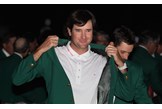 Bubba Watson beat Louis Oosthuizen in a sudden-death play-off to win the 2012 Masters.
Bubba Watson beat Louis Oosthuizen in a sudden-death play-off to win the 2012 Masters.
-
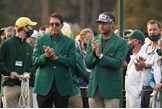 Bubba Watson and Phil Mickelson are eligible to play the Masters for the rest of their career.
Bubba Watson and Phil Mickelson are eligible to play the Masters for the rest of their career.
-
 Bubba Watson has 12 PGA Tour titles to his name.
Bubba Watson has 12 PGA Tour titles to his name.
-
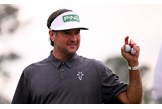
-
 Bubba Watson has dabbled in some commentary at LIV events.
Bubba Watson has dabbled in some commentary at LIV events.
-
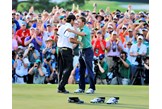 Bubba Watson commiserating Jordan Spieth at the 2014 Masters.
Bubba Watson commiserating Jordan Spieth at the 2014 Masters.
-
 Bubba Watson was presented with a gold putter by Ping President John Solheim.
Bubba Watson was presented with a gold putter by Ping President John Solheim.
-
 Augusta National have now 'Bubba proofed' the 13th hole.
Augusta National have now 'Bubba proofed' the 13th hole.
-
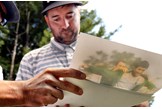 Bubba Watson signing a picture of his 'greatest moment' at Augusta National.
Bubba Watson signing a picture of his 'greatest moment' at Augusta National.
-
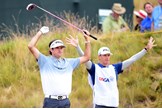 Bubba Watson never felt comfortable playing a US Open course.
Bubba Watson never felt comfortable playing a US Open course.
-
 Bubba Watson missed a large chunk of the 2022 LIV season due to injury.
Bubba Watson missed a large chunk of the 2022 LIV season due to injury.
-
 LIV Golf has expanded to 13 teams of four for the 2024 season.
LIV Golf has expanded to 13 teams of four for the 2024 season.
